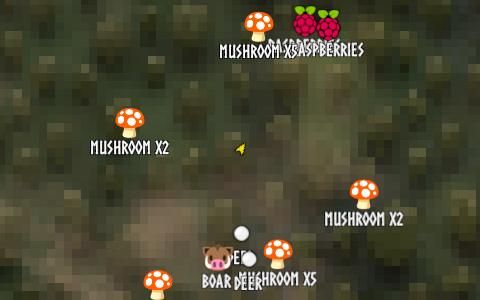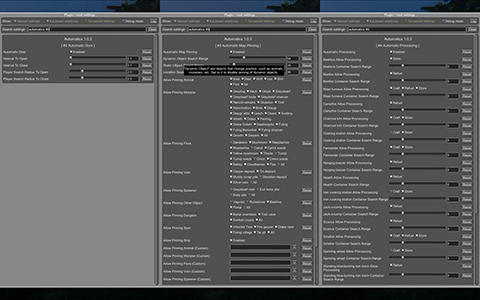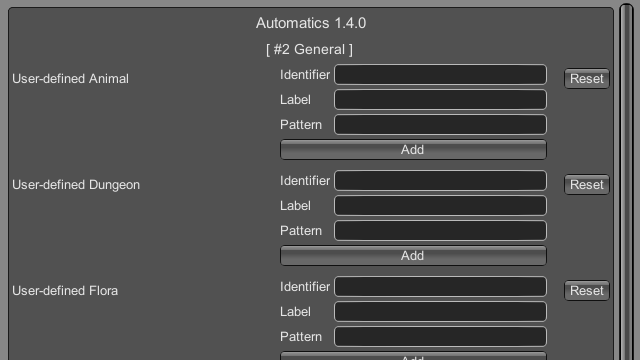Automatics is a mod that automates the tedious tasks of life in Valheim. Most of its features exist in existing mods, but it has been re-designed to make it easier for me to use.
|
Tip
|
Each of the features described below can be completely disabled using the "Disable Module" option in the configuration. |
Automatically opens and closes the door near the player. The interval and distance to detect the player can be changed from the configuration.
Automatic pinning animals, monsters, floras, veins, dungeons, etc. that exist around the player to the map. The pinning allows for each object and the detection range of the object can be changed from the config.
Custom icon pack:
You can also define your own icons in png and json files. See docs/custom-icon-pack.adoc for custom icon pack specifications.
Refueling pieces that need fuel. Deliver materials to pieces that process materials, and store items produced by pieces. These tasks can be automated via containers around the piece.
Modifies tamable creatures so that they can eat food from containers and the player’s inventory, not just items on the ground.
It can automatically repair items when the player is near a crafting station or when the crafting station GUI is opened or automatically repair nearby pieces when the player has a hammer equipped.
Automatically mines minerals in the player’s surroundings. You can also add a shortcut key that allows you to mine at any time.
Automatics add a few commands to help the user.
- automatics
-
Usage: automatics (OPTIONS…)
Displays the usage of commands added by Automatics.
- OPTIONS:
-
-i, --include=VALUE Show only commands whose names include the word specified in this option.
-e, --exclude=VALUE Exclude commands whose names contain the word specified with this option.
-v, --verbose Displays detailed usage of the command.
-h, --help Displays a help message and exits the command.
- printnames
-
Usage: printnames (OPTIONS…) (WORD|REGEXP)…
Outputs internal or display names that contain the specified string or match the specified regular expression. If multiple arguments are specified, only those matching all of them will be output.
- WORD
-
A text contained in the internal or display name. (e.g.
$enemy_,$item_,$piece_,Boar,Mushroom,Wood door); All partially matching internal and display names are output. - REGEXP
-
A regular expression of the internal or display name to be output. Must be prefixed with r/ (e.g.
r/^[$]item_,r/^boar$) - OPTIONS:
-
-h, --help Displays a help message and exits the command.
- Examples:
-
-
printnames ling r/^[$]enemy_ -
printnames r/^[$@]location_.+(?<!_(enter|exit))$ -
printnames mushroom r/^[$]item_.+(?<!_description)$
-
- printobjects
-
Usage: printobjects [TYPE] (OPTIONS…)
Display objects that can be handled by Automatics in the nearby.
- TYPE
-
Type of object to be displayed. Specify one of the following: animal, monster, flora, mineral, spawner, vehicle, dungeon, spot, other.
- OPTIONS:
-
-r, --radius=VALUE Specify the range within which the object is to be searched. [Default: 32] (Unit: Meters)
-n, --number=VALUE Specify how many objects matching the condition are to be displayed. [Default: 4]
-i, --include=VALUE Show only objects whose internal or display names match the word specified in this option. It works as a regular expression by concatenating r/ at the beginning of the string.
-e, --exclude=VALUE Exclude objects whose internal names or display names match the word specified with this option. It works as a regular expression by concatenating r/ at the beginning of the string.
-h, --help Displays a help message and exits the command.
|
Note
|
The result of this command may show objects that you feel are not of the target type. For example, a Flint appear in the Flora search. This is not a bug but means that Automatics can treat Flint as Flora. |
I recommend using Configuration Manager.
The README would be too large if we described all the details of the configuration, so we split it into separate file.
Open CONFIG.adoc to see the configuration details.
You can use the Configuration Manager to define objects that you want Automatics to work with.
Open docs/add-user-defined-object.adoc to learn more about adding user-defined objects.
In some features of Automatics, there is an option that allows the user to add targets as needed. The "Display name" and "Internal name" are used to identify these targets. The display name and internal name are matched according to different rules.
- Display name
-
Display names are the names that appear in the game, such as Boar, Deer, Dandelion, etc. The matching rule for "Display name" is a partial match, meaning that if the target display name contains the specified string, it matches. It is case-insensitive.
- Internal name
-
Internal names are the names used inside the game program, such as
$enemy_boar,$enemy_deer,$item_dandelion, etc. The matching rule for "Internal name" is an exact match, meaning that if the target internal name is identical to the specified string, it matches. It is case-insensitive. Note that internal names for translations added by Automatics are prefixed with@, not$, as in@internal_name
| Display name | Internal name |
|---|---|
Greyling |
$enemy_greyling |
Greydwarf |
$enemy_greydwarf |
Surtling |
$enemy_surtling |
| Grey | ling | $enemy_greyling | $enemy_greydwarf | $enemy_ | |
|---|---|---|---|---|---|
Greyling |
Match |
Match |
Match |
No match |
No match |
Greydwarf |
Match |
No match |
No match |
Match |
No match |
Surtling |
No match |
Match |
No match |
No match |
No match |
-
Dependencies:
Automatics is developed and released under the MIT license. For the full text of the license, please see the LICENSE file.




